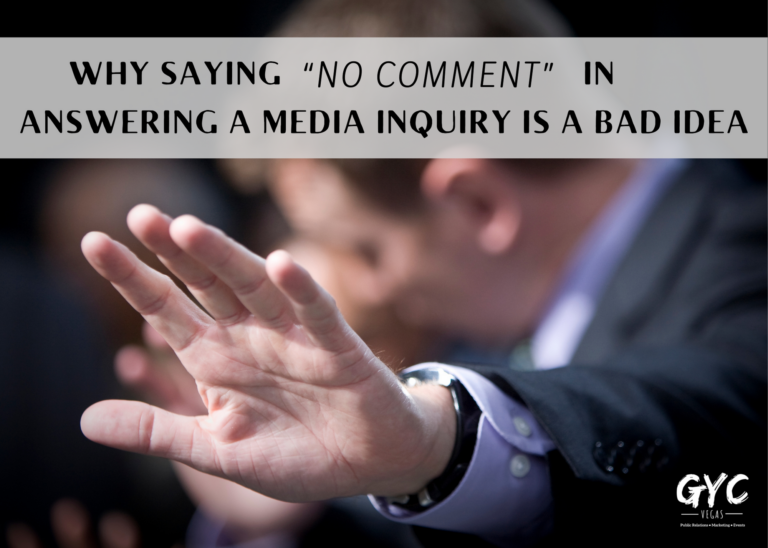When reporters ask questions, the worst thing for a spokesperson to say is “no comment.” It’s the single biggest mistake any brand representative can make during an interview, and it almost always exacerbates a given situation.
Saying “no comment” automatically implies guilt – whether or not you’ve done anything wrong.
It’s akin to a witness pleading the Fifth Amendment, which protects individuals from self-incrimination. When people respond to inquiries during a legal proceeding with, “I plead the Fifth,” everyone assumes they’ve done something that could land them in trouble.
Similarly, the public and the media both interpret a “no comment” reply as an admission of wrongdoing. They also believe people who utter those words are hiding something.
Such a lack of transparency leads to mistrust and loss of credibility that damages corporate reputations and journalist relationships. Conversely, being open and honest are the keys to safeguarding a brand’s image. Consumers want to engage with companies that are up front about how they conduct business and hold themselves accountable for any missteps.
All of that said, there are some media inquiries spokespeople cannot answer for valid reasons. For example, there may be legal, regulatory or privacy issues at play that prevent you from revealing certain information.
In those instances, there are still a variety of better responses than the dreaded “no comment.” You can use bridging techniques to acknowledge and then deflect the question by conveying a key message that still gives a journalist some pertinent information. Or, you could simply explain why you can’t answer.
Here are some examples of how to say “no comment” – which is in and of itself a comment, albeit an ineffective one – without actually using those words:
- “Unfortunately, we cannot comment on investigations that are ongoing. What I can tell you is…”
- “We are prohibited by law from answering that question.” (If true)
- “I’m sorry, but that information is proprietary/confidential.”
- “That’s an important/good question, and I will answer that when we know more. At this time, we are still investigating the situation/issue/policy/ruling, but I will update you when we have additional details. What I can tell you now is…”
- “It would be premature to comment on that because…” Ideally the reason is one that makes the company look responsible, sympathetic to victims or another admirable characteristic.
- “I appreciate that question, but I think what really matters/what’s most important is…”
- “I’m not in a position to talk about that, but we are taking the situation seriously…” Then elaborate by relaying any of your organization’s related policies, goals and commitment to resolving the issue in question.
- “Let me double check on the answer to that and get back to you.”
Any response is better than “no comment.” But, it takes strategic forethought and specialized expertise to compose responses that serve both internal and external interests when a reporter reaches out.
The media relations experts at GYC Vegas, a boutique public relations agency, have decades of experience training corporate spokespeople how to maximize the opportunities interviews present to position your brand in a positive light, no matter how challenging the questions. Contact us today to learn how we can help prepare you to answer media inquiries in a way that builds successful relationships with journalists, customers and other key audiences.

